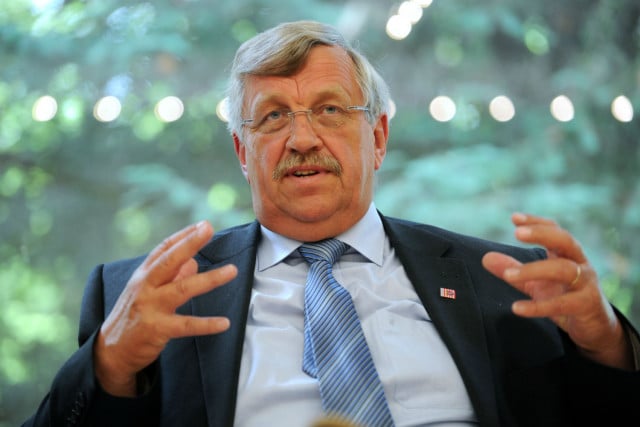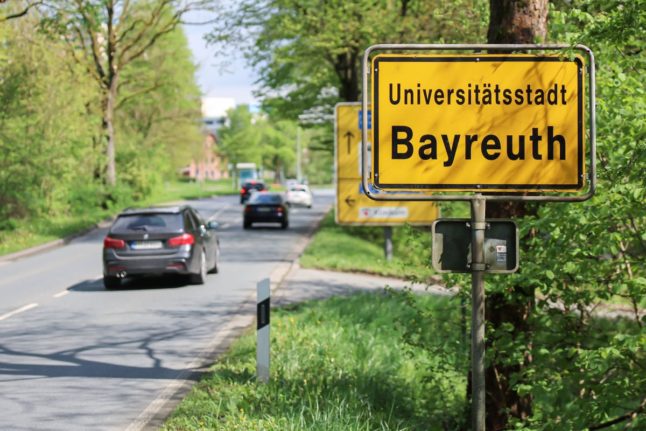“We confirm two arrests,” a spokeswoman for the Federal Prosecutor's Office told AFP, declining to give further details.
According to media reports, one of the two is a weapons seller from North Rhine-Westphalia and the other is an intermediary from Kassel.
SEE ALSO: Neo-Nazi suspect 'admits' to pro-migrant politician's murder
Elmar J., 64, was detained for selling in 2016 the weapon allegedly used by key murder suspect Stephan Ernst, who has confessed to the crime.
The second man, Markus H., 43, is held on suspicion that he set up the contact between the gun-seller and Ernst.
Previously on Wednesday, Germany's interior minister Horst Seehofer said Ernst had “confessed” to the killing of local politician Walter Lübcke and had said that he “acted alone”.
The federal prosecutor's office said in a statement the two men, both Germans, were arrested on charges of “aiding and abetting murder” and would appear before an investigating magistrate at the Federal Court of Justice later Thursday.
“We assume that both of the accused knew about the far-right views” of the murder suspect, a spokesman for the prosecutor's office told reporters.
“And we assume that they also thought it was possible and accepted that (Ernst) would use the weapons for a politically motivated killing at a later time.”
But the spokesman said there was no indication that they knew Ernst, 45, was planning to murder Lübcke, who was head of the Kassel city administration.
Lübcke was an outspoken defender of Chancellor Angela Merkel's decision to welcome refugees and in 2015 drew the wrath of right-wing extremists by telling Germans who objected that they could leave the country.
He was found dead on the terrace of his family home in Wolfhagen near Kassel, having been shot in the head at close range on June 2nd.
Neo-Nazi ties
Prosecutors confirmed that Ernst had confessed to having “several” weapons, giving details to police on how they were obtained and where he hid them.
As a result, investigators reportedly found five weapons, including the one allegedly used in the murder, buried on his employer's premises, a railway supplier in Kassel.
Ernst is said to have told police he acquired part of the weapons arsenal, which reportedly includes an Uzi submachine gun and a pump-action shotgun, in 2014 and the murder weapon in 2016.
The weapons were being examined by forensic experts.
Investigators are probing the extent of Ernst's neo-Nazi ties and whether he had links to the far-right militant group National Socialist Underground (NSU).
The NSU killed nine Turkish and Greek-born immigrants and a German policewoman from 2000 to 2007, in addition to carrying out bomb attacks and bank robberies.
SEE ALSO: Mammoth neo-Nazi trial enters final phase in Munich
Police are also investigating whether the newly arrested men have any connections to the right-wing extremist scene.
Their apartments were searched in Kassel and Höxter late Wednesday and objects related to Germany's Nazi era were reportedly confiscated.
News magazine Der Spiegel reported that in 2006, Markus H. was questioned as part of the inquiry into the murder of cafe owner Halit Yozgat — one of the nine immigrants killed by the NSU.
Spiegel also said that in 2009, Markus H. and Ernst were reportedly part of a group of nationalists who stormed a trade union rally in the city of Dortmund. Both men were arrested.
Elmar J. had no criminal record, according to Spiegel.
A rising number of right-wing extremists
On Thursday, Seehofer announced in Berlin that the number of known right-wing extremists in Germany had risen by 100 individuals last year to 24,100, compared to the 2017 figures, with 12,700 of them known to be violent.
“That is why I stress that we have a high-risk situation in this area,” he said.
Merkel's CDU party has laid partial blame for Lübcke's killing on the far-right AfD party, saying it contributed to inciting extremist hatred.
In a television interview, AfD co-leader Alexander Gauland claimed Lübcke's murder was being exploited by mainstream parties for political gain.
Railing against migrants, the AfD scooped nearly 13 percent of the vote in 2017 general elections, becoming the biggest opposition party in parliament.



 Please whitelist us to continue reading.
Please whitelist us to continue reading.
Member comments